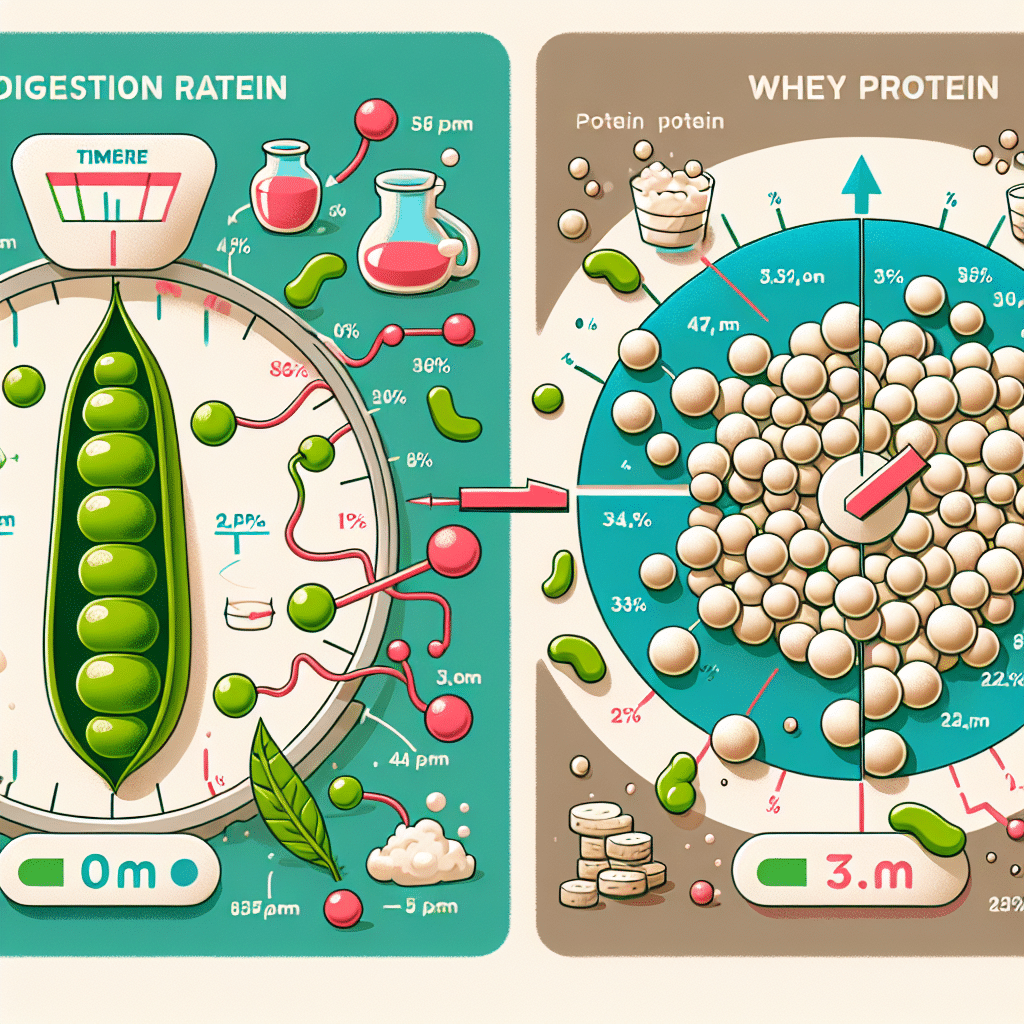Does Pea Protein Digest Faster Than Whey? Deep dive
Table of Contents
- Pea Protein vs. Whey: Digestion Speed and Efficiency
- Understanding Protein Digestion
- Whey Protein: A Fast-Digesting Option
- Pea Protein: A Plant-Based Contender
- Comparing Digestion Rates: Pea Protein vs. Whey
- Scientific Research and Case Studies
- Practical Considerations for Athletes and Consumers
- Conclusion: Digestion Speed and Protein Choice
- Discover ETprotein’s High-Quality Protein Products
Pea Protein vs. Whey: Digestion Speed and Efficiency

When it comes to protein supplements, whey has long been the gold standard for athletes and fitness enthusiasts. However, with the rise of plant-based diets and increased awareness of food intolerances, pea protein has emerged as a popular alternative. One of the key considerations when choosing a protein source is how quickly and efficiently it can be digested and utilized by the body. This article delves into the digestion rates of pea protein compared to whey, exploring the science behind these two popular protein sources.
Understanding Protein Digestion
Before comparing pea protein and whey, it’s important to understand the basics of protein digestion. Proteins are broken down into amino acids by enzymes in the stomach and small intestine. These amino acids are then absorbed into the bloodstream and used for various bodily functions, including muscle repair and growth.
Whey Protein: A Fast-Digesting Option
Whey protein, derived from milk, is known for its rapid digestion and absorption. It’s rich in branched-chain amino acids (BCAAs), particularly leucine, which is crucial for muscle protein synthesis. The fast digestion rate of whey makes it an ideal post-workout supplement, as it quickly provides the necessary amino acids for muscle recovery.
- High Biological Value: Whey protein has a high biological value, meaning it contains all essential amino acids in adequate amounts.
- Quick Absorption: The liquid form of whey allows for faster gastric emptying and absorption of amino acids.
- Rich in BCAAs: Whey’s high BCAA content is beneficial for muscle recovery and growth.
Pea Protein: A Plant-Based Contender
Pea protein is made from yellow split peas and has gained popularity as a plant-based alternative to animal-derived proteins. It’s hypoallergenic and free from dairy, making it suitable for those with allergies or lactose intolerance.
- Allergen-Friendly: Pea protein is a safe option for individuals with common food allergies.
- Complete Protein: Though plant-based, pea protein contains all nine essential amino acids, making it a complete protein source.
- Sustainability: Pea protein production has a lower environmental impact compared to animal-based proteins.
Comparing Digestion Rates: Pea Protein vs. Whey
The digestion rate of protein is influenced by several factors, including the source of protein, its form (solid or liquid), and the presence of other macronutrients. Studies have shown that animal-based proteins like whey are generally digested faster than plant-based proteins like pea. However, the difference in digestion rates may not be as significant as once thought.
- Enzyme Activity: The specific enzymes that break down protein can vary in their efficiency based on the protein source.
- Amino Acid Composition: The ratio of amino acids in a protein can affect how quickly it’s broken down.
- Fiber Content: Plant-based proteins often contain more fiber, which can slow digestion slightly.
Scientific Research and Case Studies
Several studies have compared the effects of pea protein and whey on muscle growth and recovery. A 2015 study published in the Journal of the International Society of Sports Nutrition found that pea protein supplementation was just as effective as whey protein in promoting muscle thickness gains in athletes. This suggests that despite potential differences in digestion rates, both protein sources can be effective for muscle building.
Another study examined the digestion rate of various protein sources and found that while whey protein reached peak blood amino acid levels faster, pea protein provided a more sustained release of amino acids. This could be beneficial for maintaining an anabolic state over a longer period.
Practical Considerations for Athletes and Consumers
When choosing between pea protein and whey, individuals should consider their dietary restrictions, digestion sensitivities, and personal preferences. For those who are lactose intolerant or following a plant-based diet, pea protein is an excellent alternative to whey. Athletes looking for a quick source of amino acids post-workout may prefer whey for its rapid absorption.
Conclusion: Digestion Speed and Protein Choice
In conclusion, while whey protein may digest slightly faster due to its composition and form, pea protein offers a comparable amino acid profile and can be just as effective for muscle recovery and growth. The choice between pea protein and whey should be based on individual dietary needs, preferences, and goals.
Discover ETprotein’s High-Quality Protein Products
If you’re looking for premium protein options, ETprotein offers a range of organic and hypoallergenic plant-based proteins, including pea protein. Their products are non-GMO, allergen-free, and come with a neutral taste, making them a great addition to any diet. Whether you’re an athlete, a health enthusiast, or simply looking to incorporate more plant-based proteins into your diet, ETprotein has you covered.
About ETprotein:
ETprotein, a reputable protein and L-(+)-Ergothioneine (EGT) Chinese factory manufacturer and supplier, is renowned for producing, stocking, exporting, and delivering the highest quality organic bulk vegan proteins and L-(+)-Ergothioneine. They include Organic rice protein, clear rice protein, pea protein, clear pea protein, watermelon seed protein, pumpkin seed protein, sunflower seed protein, mung bean protein, peanut protein, and L-(+)-Ergothioneine EGT Pharmaceutical grade, L-(+)-Ergothioneine EGT food grade, L-(+)-Ergothioneine EGT cosmetic grade, L-(+)-Ergothioneine EGT reference grade and L-(+)-Ergothioneine EGT standard. Their offerings, characterized by a neutral taste, non-GMO, allergen-free attributes, with L-(+)-Ergothioneine purity over 98%, 99%, cater to a diverse range of industries. They serve nutraceutical, pharmaceutical, cosmeceutical, veterinary, as well as food and beverage finished product distributors, traders, and manufacturers across Europe, USA, Canada, Australia, Thailand, Japan, Korea, Brazil, and Chile, among others.
ETprotein specialization includes exporting and delivering tailor-made protein powder and finished nutritional supplements. Their extensive product range covers sectors like Food and Beverage, Sports Nutrition, Weight Management, Dietary Supplements, Health and Wellness Products, and Infant Formula, ensuring comprehensive solutions to meet all your protein needs.
As a trusted company by leading global food and beverage brands and Fortune 500 companies, ETprotein reinforces China’s reputation in the global arena. For more information or to sample their products, please contact them and email sales(at)ETprotein.com today.














